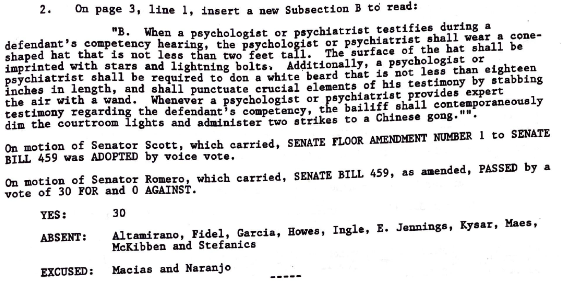For those that think understanding the legislative process is unimportant, let what was nearly the nation’s first wizard law on the books convince you otherwise. The year was 1995 in the State of New Mexico. Their 42nd Legislature was in its first session and a bill dealing with psychologists and health facilities was introduced in the Senate. SB 459 was referred to the Senate Standing Committees of Public Affairs and Corporation & Transportation. Hearings were held and the bill passed out of committee and made its way to the Senate floor for consideration. So far, so normal and not at all magical. While the bill was up for final passage on the floor of the Senate, there was opportunity to debate or amend the text. Senator Duncan Scott saw his chance and cast his spell. Frustrated with the number of psychologists and psychiatrists testifying in legal trials he offered the following amendment:

Shockingly, the amendment passed 30-0 and made its way onto the House where ultimately it was thankfully, or disappointingly depending on your love of magic, excised from the bill. While Senator Duncan meant for the stunt to be satirical, we can see how important process is for all legislation. Learning how to navigate process and find process generated documents can deepen your legislative history skill set and set you apart.
While many sources quote the full text of the amendment and discuss it, finding the actual text proved to be a bit more involved. The New Mexico Legislature website lists bills but digital access to these only goes back to 1996 (so close, yet so far away). Searching in Lexis, we can find the bill with the amendment included; however this paragraph was ultimately taken out and it’s hard to understand how exactly it all happened. The New Mexico University School of Law has a research guide, which provided more information on how to search for legislation, but in the end, contacting the reference librarians directly was a great way to go! The helpful librarians provided the original text of the amendment from the Senate Journal, which records action on the Senate Floor, and also an index from the journal that highlighted legislative moments of interest in the bill’s passage. An instance illustrating that not everything is online, especially for state documents and those of an older vintage! Abracadabra research!!